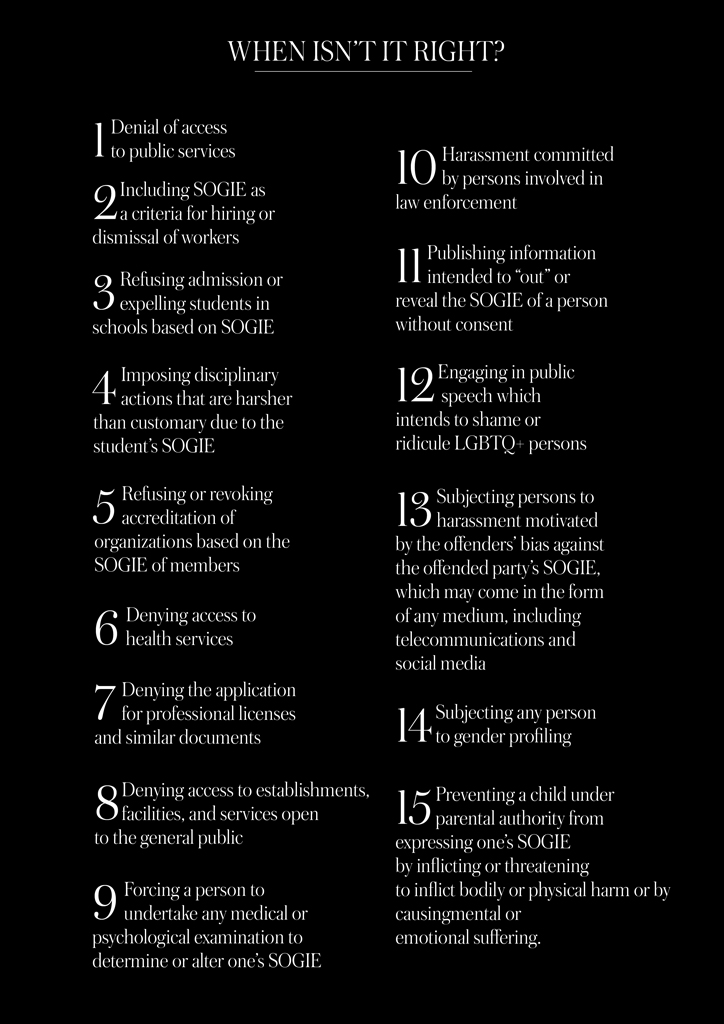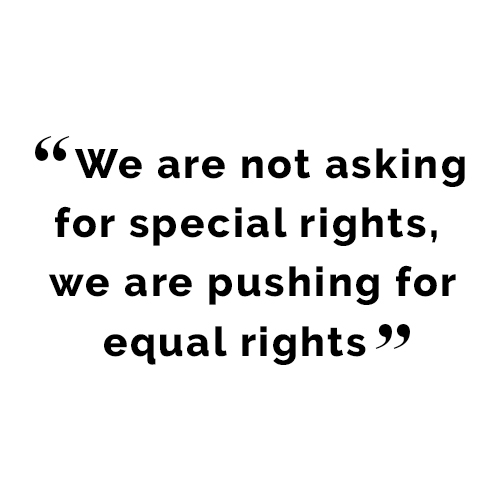Seven years ago, a year after I graduated from college and almost a year of working in events management, I realized it was time to pursue a career in the academe as a student formator. This realization didn’t come as a surprise as my years in college were spent working in the student council, and being molded as a catalyst for positive change. So, when a job opportunity as a formator in a university came up, I made sure I’d get it. It was a long application process comprising of three stages, which I earnestly and excitedly went through. By the third and final stage, it was down to me, a transgender woman against another woman, a cisgender (read: a person whose current gender identification corresponds with his or her sex assigned at birth) one. I did my very best and I was so enthusiastic and confident that I’d get the job because I had the experience, background, and passion.
To my utter sorrow, I didn’t get it. The regret email only stated that the job was offered to the other candidate and that the office wishes me well. I felt incompetent. Confused, because I sincerely knew I did well on the final stage, I figured there must be another reason why I didn’t get the job. I knew deep inside there was, but I also didn’t want to think that it’s true. A few days after I got the regret email, my hunch was validated. One of my best friends who work in the university found out from a friend who works in the HR department that my application was blocked because the university was not yet ready to employ transgender women (of course this wasn’t disclosed due to obvious reasons).
I felt powerless. I only wanted to pursue a career that I was very passionate about, but I wasn’t allowed to not because of my incapacity, but because of my gender. What was I supposed to do? Was I supposed to change my gender just so I would get my dream job? I knew I couldn’t. And why did that question even enter my mind? Why would I need to choose between living my truth and getting the job I’ve always aspired to have? I felt helpless. I wish I had been stronger and more vocal back then but I just decided to let it go.
This is one of the many reasons why the SOGIE Equality Bill (also known as the Anti-Discrimination Bill) needs to be passed. It prohibits discrimination on the basis of sexual orientation, gender identity, and expression (SOGIE), hence the bill’s name. Under the bill, the following discriminatory acts can be fined of not less than P100,000 but not more than P500,000, or imprisonment of not less than one year but not more than six years or both, depending on the court’s decision:

When isn’t it right?
- Denial of access to public services
- Including SOGIE as criteria for hiring or dismissal
- Refusing admission or expelling students in schools based on SOGIE
- Imposing disciplinary actions that are harsher than customary due to the student’s SOGIE
- Refusing or revoking the accreditation of organizations based on the SOGIE of members
of workers - Denying access to health services
- Denying the application for professional licenses and similar documents
- Denying access to establishments, facilities, and services open to the general public
- Forcing a person to undertake any medical or psychological examination to determine or alter one’s SOGIE
- Harassment committed by persons involved in law enforcement
- Publishing information intended to “out” or reveal the SOGIE of a person without consent
- Engaging in a public speech which intends to shame or ridicule LGBTQ+ persons
- Subjecting persons to harassment motivated by the offenders’ bias against the offended party’s SOGIE, which may come in the form of any medium, including telecommunications and social media
- Subjecting any person to gender profiling
- Preventing a child under parental authority from expressing one’s SOGIE by inflicting or threatening to inflict bodily or physical harm or by causing mental or emotional suffering.
Eighteen years after it was first filed (by then-Senator Miriam Defensor- Santiago in 2000), the SOGIE Equality Bill was always stalled by conservative representatives and senators.
Just last year, it passed the third reading in the House of Representatives for the first time since 2001 and is currently in the Senate. With more and more Filipinos becoming aware of it, especially the younger and more socially-active generation, the clamor for the passage of the SOGIE Equality Bill has never been stronger. But more than the fines and imprisonments stated within the bill, and more than protection against discriminatory acts, the passage of the SOGIE Equality Bill is something very personal to me and to everyone in the LGBTQ+ community where I belong.
It will mean power. It will enable us to uphold our value and worth as Filipinos, as human beings with equal rights as anyone else. It will empower us to fight for what is right and for our rights. Look, we are not asking for special rights. We are pushing for equal rights; rights that we should intrinsically have and should not be begging and fighting for to begin with. Gaining equal rights will not make non-LGBTQ+ individuals lose theirs. In fact, the SOGIE Equality Bill is not just for the LGBTQ+ community. It is for everyone.
It will mean pride. It will allow us to be comfortable and confident in our own skin. It will allow us to be proud of who we are. It will let us live our truth. Pride is our armor against prejudice. Amid judgment and discrimination, pride enables us to live happy and, well, gay.

My story is just one among millions of Filipinos who have experienced SOGIE- based discrimination. More than making sure I get my dream job free from prejudice, the SOGIE Equality Bill will protect and empower my brothers and sisters who have been denied entry to certain business and establishments, who have been mocked, who have been harassed and hurt, whose voices have been silenced just because of who they are as human beings.
We all have a voice and we should use it to elicit positive change. We shouldn’t be made to choose between being true to ourselves and getting what we deserve. Instead, we should use our voices and fight for our rights to live freely as human beings. The long and short is: the SOGIE Equality Bill must be passed now. One day, hopefully soon, I look forward to the end of the struggle where finally, I can stand witness to the day when discrimination doesn’t stop anyone from reaching his or her full potential through proudly living his or her truth.







